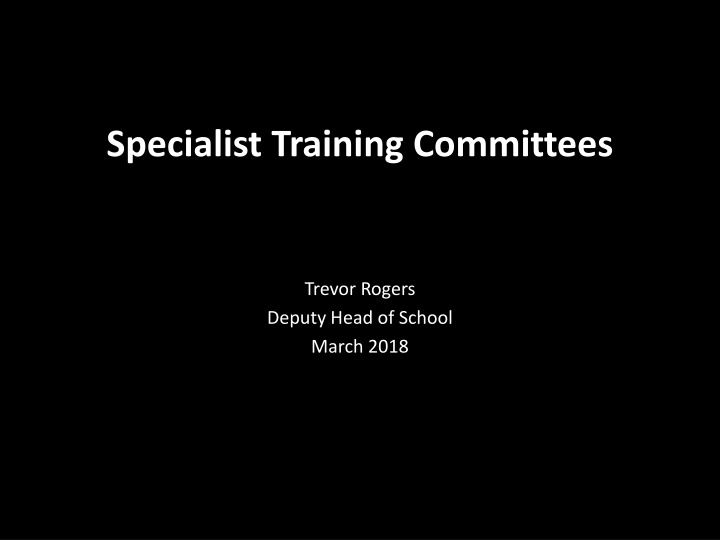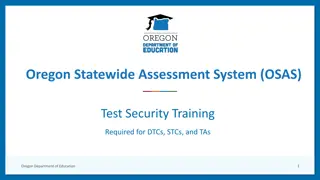
Specialist Training Committees and Roles of Deputy Heads of School in Medical Education
Learn about Specialist Training Committees (STCs) and their essential roles in managing and developing specialist training programs within medical education. Explore the functions of Deputy Heads of School and the constituent members involved in training quality assurance and management.
Download Presentation

Please find below an Image/Link to download the presentation.
The content on the website is provided AS IS for your information and personal use only. It may not be sold, licensed, or shared on other websites without obtaining consent from the author. If you encounter any issues during the download, it is possible that the publisher has removed the file from their server.
You are allowed to download the files provided on this website for personal or commercial use, subject to the condition that they are used lawfully. All files are the property of their respective owners.
The content on the website is provided AS IS for your information and personal use only. It may not be sold, licensed, or shared on other websites without obtaining consent from the author.
E N D
Presentation Transcript
Specialist Training Committees Trevor Rogers Deputy Head of School March 2018
Specialist Training Committees Gold Guide defines an STC as the committee that advises and manages training in a specialty within a locality in HEE JRCPTB defines it as committee of the postgraduate dean which has delegated to it many of the dean's duties for the specialty They feed into the School of Medicine STCs are responsible for the management and quality assurance of training within a specialty
Roles and functions of an STC The essential role is to manage and develop the specialist training programme of the individual specialty and to ensure the delivery of the highest standard of training It needs to ensure that the training programme meets the requirements of the Gold Guide and coverage of the training curriculum
Constituent members: Personnel recommended: STC chair/ TPDs Relevant deputy head of school of medicine Trainee representative Training leads for individual Trusts or local education providers Academic representative
Deanery-wide Most specialties now closely integrated across the deanery Many always meet as a pan-deanery committee Remainder should do so at least annually
Deputy Heads of School 3 Ian Wilson, Sunil Bhandari, me Medical specialties divided between us no longer on a geographic basis
Deputy Heads of School IW: Cardiology inc paediatric Geriatrics Genetics Nueurophysiology Haematology Immunology Neurology/ stroke Rheumatology GIM/ CMT in West SB: Renal AIM D&E Gastro ID GIM/ CMT in East TKR: Respiratory Oncology GU Med Occupational Med Dermatology Palliative medicine GIM/ CMT in South
Administration and management To identify appropriate training placements have appropriate approval appropriate for the level of training Lead and participate in the ARCP Ensure interests of : LTFT trainees academic trainees trainees who are out of programme LAT post holders
Delivery of training The STC chair/TPD(s), provide leadership on the actual delivery of training within the training programme Establishment, with the involvement of STC members, of an appropriate training programme ? flexible training lead with experience and expertise related to LTFT trainees
Support the TPD if needed in OOP Counselling trainees experiencing difficulties Interdeanery transfers Contributing to the annual specialty report (ASR) of the school of medicine key activities within the training programme response to the annual GMC trainee and trainer surveys deanery quality management requirements. The ASR in turn enables the school of medicine to report to the JRCPTB and national specialty reports are forwarded to the regulator
Monitoring and inspection STCs should monitor quality of the training programme Should address local training If serious, then should escalate to the relevant deputy head of school. Trust issues might necessitate involvement of the DME and may trigger QM visit. STCs can refer trainees needing extra support for review and planning of required interventions or remedial targets. "You know, Omar, I've got it, too. The feeling that we're just going in circles. (Gary Larson)
Trainee representatives Have a key role within STCs: delivering a trainee representative report at each STC meeting that allows trainees within the programme contribute to the organisation of training days /curriculum mapping encouraged to develop innovative ideas that can be incorporated into the training programme.
Recruitment to the specialty Approval of the wording of advertisements for recruitment to the specialty Interview process Allocating the successful candidates to the vacant placements

